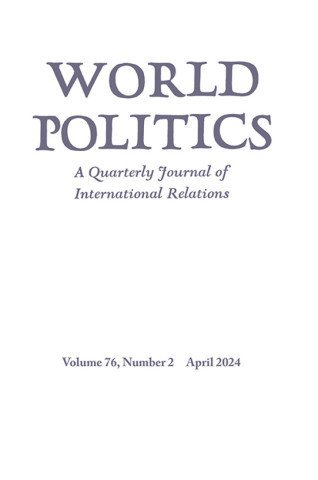贸易补偿的选举奖惩
IF 4.5
1区 社会学
Q1 INTERNATIONAL RELATIONS
引用次数: 0
摘要
摘要:当全球化对一个社区造成损害时,人们预期选民会要求补偿方案。那么,为什么在经济冲击之后,执政者会不提供额外补偿呢?作者认为,除了提供物质援助外,政府补偿还能让选民了解全球化的成本,从而引起选民的担忧。因此,提供补偿可能会损害现任者的选举前景。本文研究了美国在中国冲击时期(1990-2007 年)的这种惊愕效应。作者使用了美国贸易调整援助(taa)计划的行政工具,该计划是针对因国际贸易而失业的工人的历史最悠久的补偿制度。分析表明,当补偿发放到受冲击程度低、补偿信息价值高的地区时,会产生选举反作用。惊愕效应可以解释为什么政府往往对补偿计划投资不足。本文章由计算机程序翻译,如有差异,请以英文原文为准。
Electoral Rewards and Punishments for Trade Compensation
abstract: When globalization harms a community, voters are expected to demand compensation programs. Why, then, would incumbents fail to provide additional compensation following an economic shock? The authors argue that in addition to offering material assistance, government compensation also informs voters about the costs of globalization, generating consternation in the electorate. As a result, providing compensation can hurt incumbents' electoral prospects. This article studies this consternation effect in the United States during the China shock period (1990–2007). The authors use an administrative instrument for access to the US Trade Adjustment Assistance (taa) program, the longest-standing compensation system for workers displaced by international trade. The analysis shows that compensation electorally backfires when distributed to low-shocked regions in which the informational value of compensation is high. The consternation effect can explain why governments often underinvest in compensation programs.
求助全文
通过发布文献求助,成功后即可免费获取论文全文。
去求助
来源期刊

World Politics
Multiple-
CiteScore
8.40
自引率
0.00%
发文量
24
期刊介绍:
World Politics, founded in 1948, is an internationally renowned quarterly journal of political science published in both print and online versions. Open to contributions by scholars, World Politics invites submission of research articles that make theoretical and empirical contributions to the literature, review articles, and research notes bearing on problems in international relations and comparative politics. The journal does not publish articles on current affairs, policy pieces, or narratives of a journalistic nature. Articles submitted for consideration are unsolicited, except for review articles, which are usually commissioned. Published for the Princeton Institute for International and Regional Affairs
 求助内容:
求助内容: 应助结果提醒方式:
应助结果提醒方式:


